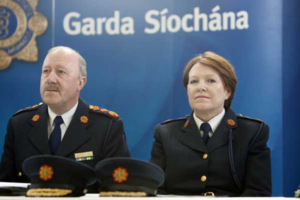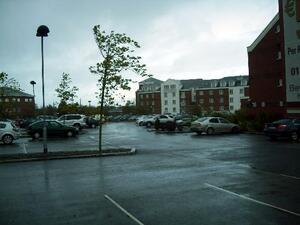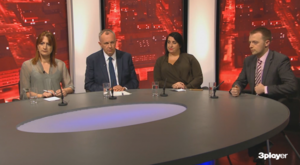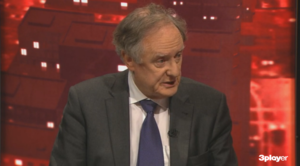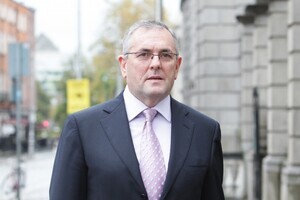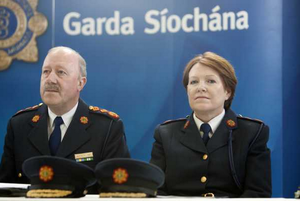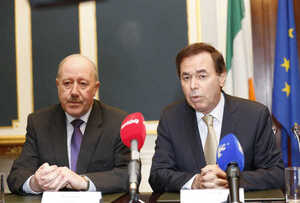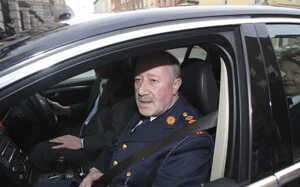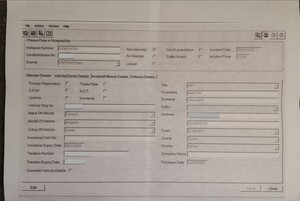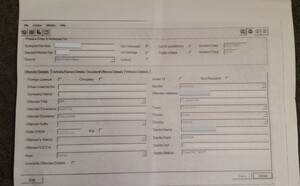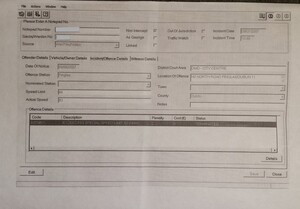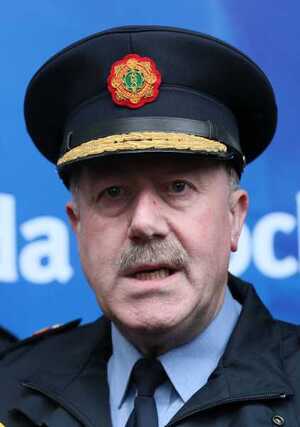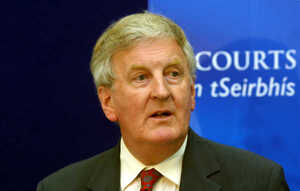
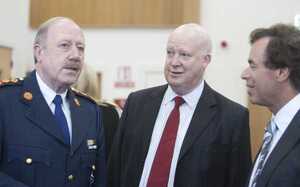
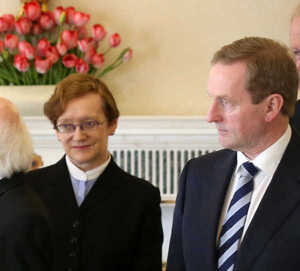
From top: Justice Niall Fennelly; Former Garda Commissioner Martin Callinan, Brian Purcell and Alan Shatter; Attorney general Maire Whelan and Enda Kenny
The 300-page Fennelly Commission Interim Report.
Laden with contradictory evidence.
And a troubling lack of notes or meeting records.
The report investigated the stepping down of former Garda Commissioner Martin Callinan in March 2014, following claims that Taoiseach Enda Kenny sacked him – contrary to law.
It was published yesterday evening at around 5.30pm just before Taoiseach Enda Kenny appeared on RTÉ Six One and told host Brian Dobson: ‘The charge made doesn’t stand up’
Readers will recall the death of Sophie Toscan du Plantier on December 23, 1996 in west Cork and the two subsequent arrests of Ian Bailey in relation to her murder investigation.
Mr Bailey claimed the arrests and other Garda actions in relation to him were unlawful and in 2007, Bailey and his partner Jules Thomas instituted High Court proceedings against the State. This action was unsuccessful and a verdict was returned on March 30th 2015.
During the discovery of documents in this case against the State, in October 2013, it emerged that incoming and outgoing telephone calls at Bandon Garda Station, pertaining to Bailey, were recorded in 1997. Three conversations in particular – two between members of An Garda Siochana, and one between a Garda and a civilian, Ms Marie Farrell – were deemed to contain material which hinder the State’s defence in the Bailey case.
It later emerged that Bandon Garda Station wasn’t the only station recording calls.
Readers may recall how, on March 10, 2014 former Garda Commissioner Martin Callinan wrote to the Department of Justice General Secretary Brian Purcell informing him of the practice of Garda station calls being recorded.
The letter requested Purcell to inform the then Justice Minister Alan Shatter of the recordings. In his letter, Callinan stated the Attorney General’s office was informed of the matter four months previous and that transcripts were forwarded to the Attorney General’s office and the Department of Justice.
The Garda Commissioner has a statutory duty under Section 41 of the Garda Siochana Act 2005 to keep the Minister and the Secretary General of the Department of Justice fully informed of various matters, including: “significant developments that might reasonably be expected to affect adversely public confidence in the Garda Siochana.”
However, Mr Shatter claims he was unaware of the letter’s existence until a copy was handed to him during a Cabinet meeting on March 25, 2014, 15 days after it had been delivered by hand to Purcell’s office on March 10.
Readers may also recall how Shatter was not informed of the stations’ recordings until March 24, 2014 – at a meeting in Taoiseach Enda Kenny’s office involving Mr Shatter, Mr Kenny, Mr Purcell, Attorney General Máire Whelan and Secretary General to the Department of the Taoiseach Martin Fraser.
Kenny sent Purcell to the then Garda Commissioner Martin Callinan’s home at 11pm that night.
The following day, on March 25, 2014, Callinan stepped down from his role after being in An Garda Síochána for 41 years – prompting Opposition politicians claiming that Kenny effectively sacked Callinan.
Only the Government has the power to remove a Garda Commissioner from office.
In April 2014, the Government appointed Supreme Court judge Mr Justice Nial Fennelly to lead a commission of investigation into the Garda tapes and tasked it with examining the circumstances of Callinan’s resignation.
The interim report from the Fennelly Commission was published dealing with two main items:
1) The furnishing of the letter dated March 10, 2014, to Shatter, and
2) The sequence of events that led to the stepping down of Callinan on March 25, 2014.
Evidence was received by the Fennelly Commission, under oath, from 26 witnesses. The initial draft report was delivered to 60 people who were identified or identifiable in the report, inviting them to make submissions. Subsequently, 20 submissions were made and ‘a number’ of amendments followed.
The Commission looked at the day-to-day communication between Callinan and Purcell from October 2013 and March 2014 and the report stated, ‘This was almost exclusively made up of texts and telephone calls.’
Fennelly found, between October 2013 and March 2014, Callinan sent between 30 and 40 texts per month from his phone to Purcell.
It also stated the Assistant Secretary in charge of Crime and Security in the Department of Justice, Ken O’Leary, was ‘almost always sent the texts as well‘.
The texts referred to breaking crime stories, such as drug seizures, robberies, assaults, shootings, knife attacks, murders, road traffic accidents and arrests, while some related to individual guards who appeared before the courts.
According to Callinan, he was made aware of issues relating to phone recordings in the Ian Bailey case ‘within a week or so of October 18, 2013‘ but ‘remained unaware of the existence of a general recording issue until a meeting with the Head of Legal Affairs of An Garda Siochana, Mr Ruane on 8th November 2013.’
On November 11, 2013, a meeting was held in the Attorney General’s office.
At the meeting were Callinan, Deputy Commissioner Noirin O’Sullivan, Ruane and Ruth Fitz Gerald, the Advisory Counsel in the Office of the Attorney General.
The report states that, during this meeting, Fitz Gerald was first briefed by Callinan about the recordings issue. She told Fennelly she advised Callinan to tell Shatter about the issue.
On November 19, 2013, Fitz Gerald briefed the Director General of the Attorney General’s Office, Liam O’Daly, about the recordings issue and, according to Fennelly, he gave a direction to the effect that the Justice Department be informed.
Ruane told Fennelly that at another meeting, on November 22, 2013, which involved O’Sullivan and pertained to the Bailey case against the State, Callinan stated, towards the end of the meeting, that he had no difficulty informing the Department of Justice.
In a handwritten note of the meeting, Ruane wrote:
“Comm has no difficulty with that & will inform Sec General.”
The Attorney General Maire Whelan told Fennelly:
‘My impression was … that the Garda Siochana were very proprietorial of their relationship with the Department of Justice and. .. my impression certainly would be that it would be not very well received if there was any intervention directly by my office.’
This was disputed by Callinan, who told Fennelly:
‘He had always assumed that the Attorney General’s Office would copy the Department of Justice with any advice given to An Garda Siochana‘.
Fennelly noted discrepancies between Callinan and Purcell’s version of events regarding who knew what and when.
Fennelly noted:
“Mr Callinan says that he did, in fact, report the matter around that time, in one or more conversations with the Secretary General of the Department, Mr. Brian Purcell. His evidence in that regard is disputed by Mr Purcell, who has no recollection of being briefed on the telephone recordings issue at any time prior to 10th March 2014. Mr Purcell goes further and says that he is certain that no such conversations took place.”
“Mr Callinan has not given any exact date or dates on which he says he spoke with Mr Purcell regarding the general recording issue. The former Commissioner has unavoidably laboured under the very substantial handicap of having no access to documents to assist him in his recollection. Against that, it is fair to note that he did not retain his personal documents.”
Indeed.
In fact, a lack of documents pertaining to Callinan’s evidence was highlighted in detail by Fennelly.
He noted:
“It has been striking how little documentary evidence is available. Important decisions were not formally recorded and were communicated orally. Such work practices make it very difficult to identify what decisions were made, by whom and for what reasons.”
Fennelly added:
“The Commission requested from An Garda Siochana all relevant documents, correspondence and reports relating to the matters the subject matter of this report and, in particular, sought diaries and personal notebooks belonging to the former Garda Commissioner, Mr Martin Callinan. Mr Callinan informed the Commission that he had cleared out all personal papers after he announced his retirement on March 25th 2014 and that he did not have any written notes to support his evidence, particularly in relation to informing Mr Brian Purcell, Secretary General of the Department of Justice about the issue of the telephone recordings.”
“Furthermore, assistant commissioner Jack Nolan – the liaison person appointed to assist Fennelly’s investigations – said, ‘I am advised that the then Commissioner, at some point in the late afternoon [March 25th 2014] went to a filing unit in the Conference Room where he kept personal papers. He asked Superintendent Walsh to get some black refuse sacks as he wished to sort through his files. Later still he asked Superintendent Walsh to dispose of several bags of personal papers. There were possibly 8 – 10 bags, filled to a few inches if (sic) paper in each bag and knotted on the top. Superintendent Walsh advises that he did not see nor was he aware of what was contained in the bags other than then Commissioner Callinan informing him that they were personal papers gathered over the years. Assistant Commissioner Nolan went on to say that the black sacks were brought from the Conference Room to the shredding bins, which remained locked until the papers were shredded on April 4th 2014.”
Fennelly went on to request access to Callinan’s mobile phone.
However, it found:
“Given the evidence that had been received, that almost all communication with the Department of Justice was through texts, the information contained on the mobile phone of Mr Callinan was extremely relevant. The Commission asked Mr Callinan about his mobile phone . He confirmed that the phone he used as Commissioner was an official phone. He said he did not know where it was…the Commission made enquiries of An Garda Siochana regarding the former Commissioner’s mobile phone. Assistant Commissioner Nolan said that the phone had been returned to An Garda Siochana by Mr Callinan, that the SIM card had been removed and the phone then returned to Mr Callinan. He went on to state that he believed that the SIM card was subsequently destroyed.”
“Following this information, the Commission again wrote to Mr Callinan and asked him to search for the phone. He found it and furnished it to the Commission but it had no SIM card in it and no information stored on it. The Commission wrote to Assistant Commissioner Nolan requesting details of how the SIM card had come to be destroyed and who had authorised this, as well as details of the policy of An Garda Siochana in relation to mobile phones once members have left office. Assistant Commissioner Nolan was originally of the view that the SIM card had been destroyed in Garda Headquarters but subsequently stated that the SIM card had not been returned by the former Commissioner and it had been cancelled remotely on May 30, 2014, as it had not been used since April 16, 2014.”
Following on from this, Fennelly issued a discovery order to the service providers for Callinan’s phone.
But it found:
“As a result of this order, a certain amount of meta-data was made available to the Commission but the contents of text messages were not retrievable.”
Callinan was able to furnish Fennelly with his diary for 2014 but not for 2013.
It was noted:
“Mr Callinan was able to produce to the Commission his personal diary for 2014, but could not locate his diary for 2013 and searches carried out by An Garda Siochana have also failed to produce it. If the former Commissioner, on retirement, was in a position to take his diary for 2014 with him, one would have thought that he would also have the diary that related to 2013. However, Mr Callinan has been unable to find it, in spite of several requests from the Commission. If, on the contrary, the former Commissioner’s 2013 diary remained at Garda Headquarters, it might have been expected that it would be carefully preserved in circumstances where the Government announced the establishment of a Commission of Investigation on the very day of the Commissioner’s retirement. It must be presumed that the diary for 2013 was included in the bags of “personal papers” that were shredded following Mr Callinan’s departure.”
As for the diary of 2014, Fennelly noted two entries of interest:
• On 7th January 2014 , Mr Callinan wrote: “Meeting Sec. Gen here on Thursday [January 9] c 10am – update him on Murders, phone recordings , Bailey etc.”
• On 10th March 2014 , Mr Callinan wrote: “Letter to Sec Gen by hand – Update on phone recordings @ Stations.”
Curiously, Fennelly noted that Callinan didn’t bring these entries to the attention of Fennelly and that he ‘appeared unaware of their existence until the Commission asked him to comment on them.’
In regards to the meeting on Thursday, January 9, Fennelly noted that neither Callinan nor Purcell could recall the meeting.
Fennelly also issued a discovery order to Callinan’s mobile phone service provider. However…
“[The discovery order] allowed the Commission to obtain and examine records of telephone calls made between the Commissioner and Mr Purcell, as well as calls between their respective offices; but, in circumstances where Mr Callinan has not been able to specify with certainty the dates on which he believes he spoke with Mr Purcell about the recording issue, these records are of limited assistance.”
The Department of Justice provided Fennelly with copies of text messages sent between Callinan and Purcell between October 2013 and March 2014 from Purcell’s phone and they yielded no mention of the Garda tapes.
However, after obtaining all available records of phone calls between October 1, 2013 and March 25, 2014 – between Callinan and Purcell – a call lasting 7 minutes and 25 seconds long was recorded as having taken place on November 13, 2013, from the Justice Department to the Commissioner’s office. Callinan told Fennelly he believed it was during this call that he told Purcell about the Garda tapes issue. The record of this call was in records provided by the Department of Justice but not in those of An Garda Síochána.
Another call on November 26, 2013 – from Purcell’s office to Callinan’s office, lasting 17 minutes and 28 seconds – was recorded. Callinan told Fennelly he believed this was the second time he spoke to Purcell about the recording issue. No note or other written record of the content of these telephone conversations has been found.
In conclusion on the question of whether Callinan told Purcell prior to March 10, 2014, largely based on the two diary entries that Callinan didn’t make Fennelly aware of and the 17 minute and 28 second phone call of November 26, 2013, Fennelly found:
‘The Commission accepts that some verbal report of a general kind was made, but it was not of such significance as to make any real impact on Mr Purcell. It is significant that Mr Callinan agrees that he did not ask Mr Purcell to inform the Minister.’
It added:
‘Such a verbal report did not comply with the Commissioner ‘s obligation to keep the Secretary General and the Minister “fully informed” as required by s. 41 of the Garda Siochana Act 2005.’
In its investigation of why Shatter did not receive Callinan’s letter of March 10 until March 25, Fennelly noted that Shatter was just after returning home from Mexico on the morning of Friday, March 21, 2014.
At lunchtime on that day, the Assistant Secretary of the Department of Justice Michael Flahive attended a meeting with Shatter for 90 minutes. During the meeting, the matter of the Garda tapes nor the letter of March 10 ever arose.
Fennelly noted:
‘The Assistant Secretary of the Department of Justice, Michael Flahive, who was in charge of this issue in the absence of the Secretary General, Mr Purcell, continued to believe that the Minister had, in fact, been informed of the letter… Mr Shatter, in his evidence to the Commission, made pointed comment on Mr Flahive’ s failure to mention the letter of 10th March 2014 at a meeting which largely concerned An Garda Siochana. Mr Flahive, in his evidence, reiterated that he was working under the assumption that the Minister was aware of it, because he thought that Mr Purcell would have informed him.’
Later that day, Flahive received a voicemail from Mr Liam O’Daly, Director General of the Office of the Attorney General, asking him to ring him.
Fennelly found:
“Mr O’Daly asked Mr Flahive whether the Minister for Justice had been fully briefed, both in relation to the Bailey situation and the more general recording issue. According to Mr O’Daly, Mr Flahive assured him that the Minister was fully briefed up. Mr Flahive agreed that he had conveyed to Mr O’Daly that the Minister was aware of both the Bailey and the general recording issues. Mr Flahive gave these assurances based solely on his mistaken belief, perhaps more accurately, his assumption that the Secretary General of the Department, Mr Purcell, had given the Garda Commissioner’s letter of 10th March to the Minister for Justice.”
Fennelly noted that while Flahive was of the understanding that Shatter had received the letter, the call from O’Daly prompted him to think the Attorney General had serious concerns about the matter.
Fennelly found:
“Flahive told the Commission that he had a distinct memory of sitting at his desk for maybe 30 seconds or so, thinking whether he would ring the Minister. He decided that he would. This telephone call has presented the Commission with one of its most difficult and challenging issues. Two persons of distinction have given directly contradictory versions of the facts. Since the credibility of each of these persons is in issue, the Commission has treated it with great care.”
“At first, the Minister for Justice’s private secretary could not put Mr Flahive through, as the Minister was on another call, but he soon called back and put the call through. Firstly, Mr Flahive asked the Minister if he was aware of the issue of the general system of recording calls from certain Garda Stations. The Minister said that he was not. Mr Flahive was surprised, given his belief that the Minister had received the letter of 10th March 2014. Mr Flahive said that he “straight away realised that the Minister didn’t know anything about this. ” He said that he explained the matter as succinctly as he could, but does not think he mentioned the letter itself. In fact, he did not have the letter in front of him. Mr Flahive gave the following account in his written statement to the Commission:-
“I then advised the Minister of the essence of the letter from the Garda Commissioner, namely of the discovery, in the context of the Ian Bailey case, of a general system of recording of phone calls to and from certain Garda stations, that the practice had been stopped by the Garda Commissioner in November 2013, that the Commissioner was consulting the Office of the Attorney General and the Office of the Data Protection Commissioner on how best to deal with the recordings which had been retained, that the Attorney General was personally greatly concerned at the emergence of the practice, that the Attorney General was likely to raise this matter at Cabinet, and that Mr O’Daly intended to meet the Secretary General and me on Monday to discuss the matter. I indicated to the Minister that he would be updated on the outcome of that meeting .”
‘Mr Flahive has told the Commission that he was absolutely categoric that he “explained the entirety of the substance of the letter from the Commissioner”. As stated however, he did not have the letter with him. Nor did he tell the Minister about it.’
Shatter told Fennelly that Flahive never mentioned the letter in his phonecall – matching the evidence of Flahive in that regard.
However, Shatter also said Flahive ‘did not brief him about the existence of the tapes or the Attorney General ‘s concerns.’
In a written submission to Fennelly, Shatter said:
“I can categorically state that Michael Flahive did not raise any issue that caused alarm bells to ring with me – which a full account of the contents of the Garda Commissioner’s letter and the Attorney General ‘s level of concern as expressed by Liam O’Daly would certainly have done.”
Similar to the discrepancies between Purcell and Callinan’s evidence, Fennelly found that of Shatter and Flahive were also at odds:
“Mr Flahive reiterated in his evidence that he was one hundred per cent sure of it, that he had not the slightest doubt about it, the conversation took place exactly in the way he had described it. Mr Shatter was equally categorical that he was not briefed by Mr Flahive in the manner described by him.”
On March 26, Flahive became aware that Shatter was going to tell the Dáil that he first learned of the Garda tapes on March 24 and that he wasn’t going to tell the Dáil that Flahive called him on March 21.
After speaking with Purcell about his concerns, Fennelly noted,
“Mr Flahive prepared an aide-memoire [on March 26, 2014] which was handwritten on an A4 sheet of paper. It stated:- “Spoke to Sec Gen this morning about sentence in Minister ‘s Dail statement for today to the effect that the first he heard of the existence of a general system of recordings of phone calls to and from Garda stations was on Monday of this week (24 March) and that he did not get a copy of the Commissioner ‘s letter of 10 March until Tuesday (25 March). I reminded Sec Gen that, after speaking to Liam O’Daly, who impressed upon me the importance of the Minister being briefed on this, I had rung the Minister on Friday afternoon (21 March) at around 4.30, and advised him of the discovery of the general system, having first checked with him whether he knew about it (which he didn’t). Sec Gen said that he had this morning raised this with Minister, but the Minister said that he had no recollection of the phone call.”‘
In addition, Flahive also told Fennelly that he informed four colleagues in the Department of Justice of his call to Shatter on Friday, March 21 and that each of these people confirmed this in writing to Fennelly.
On this matter, Fennelly concluded:
“The Commission considers it likely that Mr Flahive did make some mention of the fact that the Attorney General had concerns about the recording issue. However… it seems likely that Mr Flahive did not convey any sense of urgency about the matter in his telephone conversation with the Minister… The Commission is completely satisfied that the Minister acted genuinely as having no awareness of the general recording issue until the evening of Monday , 24th of March 2014.”
In relation to the Attorney General Máire Whelan, she met with Kenny and Fraser on the evening of Sunday, March 23, to discuss the Garda tapes.
Fennelly noted:
“She has told the Commission that, to paraphrase her letter of 5th May 2015, her office was not in possession of sufficient facts to be able to advise. As she said, the ”people in possession of all the information about the circumstances were An Garda Siochana “. In these circumstances, it is surprising that the Attorney took no steps to have contact made with the Garda Commissioner, in order to seek further information on the origin, extent and use of Garda telephone recording systems. After all, it was An Garda Siochana that was seeking advice from the Attorney General’s Office. It is difficult to see how the office would have any difficulty in seeking further information from the body which was effectively in the position of a client. The Attorney did ask her own staff to obtain background information on the recordings which related to the Bailey case. However, as far as the general recording issue was concerned, she gave no instructions to seek further information from An Garda Siochana. Nor did she make contact with the Minister for Justice, who was the primary conduit of information between An Garda Siochana and the Government.”
Fennelly said, in her oral evidence, Whelan told the Commission that:
“…she told the Taoiseach that An Garda Siochana, a central body in the State, had engaged in an extensive practice for decades:- “of recording telephone calls in and out of Garda Stations in complete violation of the law, with total disregard for the requirements predating the 1983 Act [the Postal and Telecommunications Act 1983] of ministerial authorisation , in the light of the Kennedy and Arnold decision and the clear articulation of rights of citizens under the Constitution. .. ” So far as she was concerned, “this was criminal activity being engaged in by An Garda Siochana “. There was no lawful basis that she could find for such behaviour. She did not know what use the material was being put to. She “had real concerns about the rights of individual accused persons, detainees and telephone calls with solicitors”. If that were seen to have occurred it would be “a most grievous matter“.”
However:
“On 22nd May 2015, the Attorney made a written submission to the Commission, with the effect of substantially modifying her earlier evidence of what she had said at the meeting . She now says that, contrary to the evidence given by her at her first hearing by the Commission, she did not convey an unequivocal view to the Taoiseach “as to whether any individual or body had been guilty of criminal activity.”‘
“In essence, the Attorney now says that, at the meetings on 23rd and 24th March 2014 , she had not given an unequivocal view as to whether any individual or body had been guilty of criminal activity. She apologises for having given a contrary impression in her evidence to the Commission and regrets that her “at times trenchant language ” had undoubtedly left the Commission with what she calls an erroneous impression that she had used such language at the meetings and, in particular , that she had used language alluding to criminal activity at the meeting with the Taoiseach and Mr Fraser on the 23rd of March 2014.”
Furthermore:
“The Attorney denies using the language of criminality, at least in the sense that she did not say that any particular person or body had committed an offence. It is nonetheless striking that the Attorney General, on the first occasion on which she gave evidence to the Commission, clearly said that she had conveyed to the Taoiseach that An Garda Siochana had, for decades, been involved in a criminal enterprise . That would have been extreme language, if she spoke in those terms. The Commission respects the fact that the Attorney, in a careful and considered written submission, has now modified her evidence and has expressed regret for any contrary impression created. It accepts her qualification of her evidence, as far as it goes. However, it also notes that the Attorney’s initial evidence on this point was given in response to a direct question from the Commission as to what she said to the Taoiseach regarding her concerns on 23rd March.”
Fennelly noted that it was odd that neither the Taoiseach nor Whelan contacted Shatter at this point, given that O’Daly, the Director General of the Attorney General’s Office, had, just two days before, contacted the Department of Justice to find out if Shatter was ‘fully briefed’ on the issues. It also noted that O’Daly wasn’t aware of Whelan and Kenny’s meeting on Sunday, March 23 until after Callinan had stepped down.
On March 24, at about 6pm, Purcell and Flahive met Shatter to brief him on the Garda station recordings issue.
Fennelly noted:
“The briefing had not concluded when it was interrupted by a telephone call from the Taoiseach to the Minister calling him to a meeting in his (the Taoiseach’s) office. The Minister left at once. While it is not clear to what extent the issues concerning the telephone recording system had been discussed before the Minister left, it is clear that, once more, the letter of 10th March 2014 had not been mentioned by either by Mr Purcell or Mr Flahive before the meeting was interrupted.”
In his evidence to Fennelly, Shatter expressed surprise at Whelan for not informing him of the Garda tapes before she briefed the Taoiseach particularly given that they would have been in contact very often.
In response to this, Whelan told Fennelly,
“The Attorney, in response to this point, said that the Minister was, as she put it, ”part of the narrative “. She said, in her evidence:- “But there was also another reason [for not contacting the Minister], and that is, part of the issue involved the Minister himself. So, in addition to being the Minister seised with functions under the legislation regarding the Gardaí, he was also part of the narrative and there were issues, allegations touching and concerning the Minister himself personally …. So, he was very much directly involved but as a participator rather than as the line Minister” .”
In relation to this, Fennelly noted:
“The Attorney’s failure to contact Mr Shatter is all the more puzzling, in circumstances where she had been informed that the Minister for Justice was “fully briefed” on the matter. Given that her instructions from the Taoiseach on Sunday night had been to “check and double check the facts” , it is somewhat perplexing that she did not contact the one person who, as she believed, was in a position to enlighten her. In addition, Mr Shatter, as Minister for Justice, was uniquely placed to contact the Garda Commissioner for explanations and clarifications. The Commission accepts that the Attorney was not under any duty to contact the Minister in these circumstances, but considers that it would have been both reasonable and prudent for her to have done so.”
As for Kenny, he told Fennelly he didn’t believe he was required to contact Shatter. He told the Commission,
“I wasn’t under any requirement at all to have the Minister attend at any meeting here. The Attorney generally apprised me of certain facts. I asked her, as was my responsibility, to have those facts checked and double -checked andfrom my point of view to get a written analysis of those facts so that I would be clear about what I was dealing with. So there wasn’t any requirement to have anybody else there while I asked the Attorney General to check what she was telling me and have it verified “.
The sending of Brian Purcell to the home of Martin Callinan was decided during a meeting on the evening of Monday, March 24. At the meeting were Kenny, Whelan and Fraser and it started at 6pm.
Kenny called Shatter to join the meeting at 6.20pm. Purcell joined at around 9pm at the request of Fraser. The meeting ended at 10pm, after which Purcell went to Callinan’s home.
So what happened at the four-hour meeting?
Who knows.
Fennelly noted:
“The Commission faces… a dual dilemma. Firstly, the participants differ significantly, on some points sharply, in their recollection of what was said, on some of the most crucial points. Secondly , nobody attending the meeting took any note or record whatever of its proceedings. There is significant divergence in the evidence of the participants concerning the absolutely central question as to the content of the message that Mr Purcell was asked to convey to the Garda Commissioner. The Commission asked Mr Fraser, as Secretary General to the Government, why there was no record ofthis important meeting and he told the Commission that the way the Government operates is that the minutes of Government meetings are limited to recording the decisions made . No minutes are kept of who said what at a meeting… Although a decision was, in fact, made at the meeting of 241 h March 2014, no record at all was made of what was decided.”
“It is agreed by everybody who attended the meeting that a decision was made to ask Mr Brian Purcell , in his capacity as Secretary General of the Department of Justice, to visit and speak to the Garda Commissioner at his home, on behalf of the Taoiseach. No note or record, of any kind, was made of what Mr Purcell was asked to say to the Commissioner. Regrettably , there is sharp disagreement between the participants at the meeting regarding that precise question… From the evidence given by Mr Fraser, it appears that the Commission must rely on the record of the Cabinet decisions of 25th March 2014 to ascertain what decision was made at the meeting in respect of the Garda Commissioner. That record shows that the Commissioner had announced his retirement. It discloses neither the fact that Mr Purcell was required to attend at the Commissioner’s house nor the instructions given to him. Of these important matters, there is no record of any kind.”
It added:
“It is particularly unfortunate that nobody attending the meeting, except for Mr Brian Purcell, knew that the Commissioner had, fourteen days earlier, written formally to him as Secretary General of the Department of Justice, outlining the basic facts of the very issues which were the subject of the meeting. Unfortunately, Mr Purcell failed to mention this letter at any stage. Thus, a meeting which concerned essentially the Garda telephone recording issue, regarded by all as a serious new issue, so important that the Secretary General of the Department of Justice was to be sent to speak to the Commissioner late at night in his home, took place in entire ignorance of the fact that the Commissioner himself had already taken the step of officially notifying the relevant Government Department about it.“
Fennelly’s summary of each of the attendees’ evidence concerning the meeting included the following:
Purcell:
“At some points in his evidence , Mr Purcell seemed to say that the Taoiseach was saying that he “would not” as distinct from “might not, ” in the situation envisaged, be able to express confidence in the Commissioner. After close questioning , Mr Purcell accepted that “might ” was the correct formulation.”
Fraser:
“Mr Fraser ‘s recollection was that the Taoiseach was very concerned that, were he to tell the Cabinet about the recording issues, that would aggravate an already difficult position for the Commissioner and the Government. He continued:- “And the question of whether he [the Taoiseach] could express confidence in the Commissioner in that situation (which was at that point hypothetical, but likely) was on his mind. He was also, and he said this several times, … very concerned that ifhe at any point/ailed to express confidence in the Commissioner, that the Commission er would presumabl y feel compelled to resign, That was supposition on his part , and he was very anxious about that respect. ” Mr Fraser added: “there was a possibility that the Taoiseach would not be able to express confidence in the Commissioner. “
Shatter:
“Mr Shatter did not recall the Taoiseach saying , as Mr Fraser had said he did, that “he was very concerned that if he at any point failed to express confidence in the Commissioner, that the Commissioner would presumably feel compelled to resign. ” However, Mr Shatter added that he was “sure that the Taoiseach was very aware of the fact that if at any time he failed to express confidence in the Commissioner the Commissioner would be compelled to resign.”
Whelan:
“In response to questions from the Commission about the evidence given by Mr Fraser in particular, the Attorney accepted that the Taoiseach was ”preoccupied” by what would happen when these new developments were brought before the Cabinet. She stated:- “The Taoiseach did say that he had repeatedly expressed confidence in the Commissioner, he did say that, yes … And the question of whether he could express confidence in the Commissioner in that situation was on his mind. He was very troubled. .. He was deeply troubled. I mean, he had indicated, without hesitation, given the gravity of the matter, that this warranted a Commission of Investigation. .. “
Kenny:
“The Taoiseach in his evidence referred, on a number of occasions, to the fact that he had previously and unequivocally expressed confidence in the Commissioner. When asked to comment on the evidence of Mr Shatter that, when the revelation of the tapes was under discussion, the Taoiseach said that the matter was very grave and that he would have difficulty in expressing confidence in the Garda Commissioner, he did not expressly deny having used those words, although he could not recall using them.”
In addition, former Tánaiste and Labour leader Eamon Gilmore also gave evidence to Fennelly in relation to a meeting they had on the morning of Tuesday, March 25.
Fennelly noted:
“The Taoiseach, according to Mr Gilmore , went on to say that, if he were asked in the House if he had confidence in the Garda Commissioner , he would not be able to say that he had. He added that, if he said that he had confidence in the Garda Commissioner on the Tuesday, and information relating to these tapes emerged on the Wednesday, he would then be in a very difficult position.”
In conclusion, Fennelly noted:
“The Commission finds it impossible to resist the conclusion that, in some form, the Taoiseach did, indeed say that, putting at its lowest, he might, in light of an impending difficult Cabinet meeting, have difficulty in expressing confidence in the Commissioner. He did so in the knowledge that any equivocation in his expression of confidence was problematic for the Commissioner.”
As for what Purcell was instructed to do, Fennelly was, again, at odds – a situation, it noted, was compounded by the absence of notes or a record of what was said.
It found:
“There is sharp controversy as to the substance of the message which Mr Purcell was instructed to impart to the Commissioner. In brief summary, Mr Purcell says that he was asked to convey to Mr Callinan the gravity with which the Taoiseach viewed the matter of the Garda telephone recording systems and to ask him to consider the situation. This view is largely supported by Mr Shatter and, effectively, by Mr Fraser. The Attorney General and the Taoiseach, on the other hand, say that Mr Purcell, while conveying the gravity of the Taoiseach’s concerns, was also asked to obtain the views of the Commissioner.”
It added:
“In summary, each of [their] statements says that Mr Purcell was to convey to the Garda Commissioner the gravity with which the Taoiseach viewed the matter or, as it was expressed in some cases, the Taoiseach’s concerns. In that, the five statements are entirely consistent. Mr Fraser, Mr Purcell and the Attorney General speak of “gravity” or “grave concerns. “‘
However:
“If an important component of Mr Purcell’s instructions was that he was to obtain any response, whether in the form of information or views, it is most surprising that none of these five, carefully prepared, written statements says so. It would be extraordinary if an essential component of Mr Purcell’s instructions was omitted by all five such able and experienced politicians and civil servants . This cannot have been accidental.”
In relation to the idea that the Callinan’s position was at issue, Fennelly noted:
“Mr Fraser said in his written statement that the possibility of the dismissal or removal of the Garda Commissioner from his post was not discussed. That evidence was not contested by anyone.”
However, Fennelly stated that in giving evidence, Shatter said:
“The intent of a message going to the Commissioner that indicated very clearly to him that his position was in great difficulty or that he should consider his position.”
In a handwritten note in his diary, written the morning after the visit from Purcell, Callinan wrote:
“BP [Brian Purcell] rang – said he wanted to see me. Sent by Taoiseach , briefed by AG taped telephone calls to Stations etc. – treating the matter very seriously. Putting on Cabinet Agenda next morning will announce Commission of Investigation . Taoiseach unsure how cabinet would receive news. Wanted me aware. I asked – was it perceived I had done something wrong and was assured that was not the case (BP’s conversation with MF). Failed to understand the need for visit!! I asked did the Taoiseach believe I had something to do with setting up recording on non 999 telephone calls – shook his head and said that was not mentioned to him. I asked was it the case that the Govt. did not have confidence in me as Cr. – Sec Gen said there was to be a meeting early the next morning in advance of Cabinet meeting where matter would be discussed – not told who was attending the meeting. Took it visit from Sec Gen meant I was to consider my position, that being the case, I wanted some time to announce my retirement- said I would ring him in the morning. I rang Sec Gen shortly after leaving my house- expressed a desire to retire on 23/5/14 having served 41 years in AGS.”
Callinan also told Fennelly:
“I want to be very clear, there was absolutely no options put on the table to me… I was left in no doubt what I had to do then that evening. I was left in absolutely no doubt.”
Among his overall conclusions, Fennelly found:
“The event which precipitated the Commissioner ‘s decision to retire on 25th March 2014 was the visit of the Secretary General of the Department of Justice to his home late on the night of Monday 24th March, to inform him that the Taoiseach regarded matters involving Garda telephone recording as very grave.”
“The events leading up to the retirement of the Garda Commissioner were beset by serious information deficits and multiple failures of communication.”
“There was no question at the meeting on 24th March of any proposal being made that the Government consider the removal of the Commissioner from office. The Commission accepts that the Taoiseach did not intend to put pressure on the Garda Commissioner to retire.”
“It was, however, the Taoiseach who made the decision to instruct the Secretary General of the Department of Justice to visit the Commissioner at his home, late at night and to inform him that he considered the matters involving Garda telephone recording systems to be a matter of the utmost gravity.”
“The Commission finds that the Taoiseach did not instruct Mr Purcell to obtain the views of the Commissioner on any particular questions; nor did the Taoiseach invite the Commissioner to contact him.”
“Mr Purcell was, at least implicitly, instructed to tell the Commissioner that the matter of the Garda telephone recording systems would be discussed at Cabinet on the following day, that the Taoiseach would be proposing the appointment of a Commission of Investigation and that there was a possibility that he, the Taoiseach , would be in a position where he might not be able to express continued confidence in the Commissioner.”
“Although the Commissioner was conscious of other recent events which had resulted in controversy for himself and for An Garda Siochana, the immediate catalyst for his decision to retire was the visit of the Secretary General of the Department of Justice to his home, and the message that was conveyed to him from the Taoiseach during that visit.”
Read the report in full here
Previously: It Wasn’t Me
The Thin Blue Timeline [Updated]




